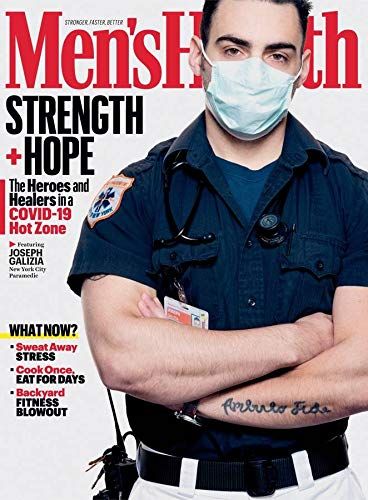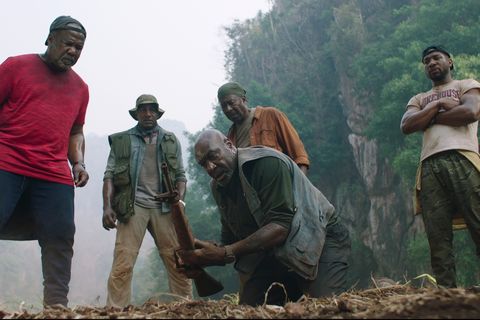No one could fault you if you watched the latest Spike Lee Joint, Da 5 Bloods, and wondered whether it was based on a true story. After all, most war movies are—even recent films like 1917 and Midway have very directly referenced real events. In many ways, Da 5 Bloods is rooted in reality, though Lee’s latest feature isn’t explicitly based on any true story, characters, or people. Lee was primarily inspired to make the story as a way to tell the stories of Black veterans who put their lives on the line for the country, but never had their stories told on the big screen for audiences everywhere to see.
Da 5 Bloods tells the story of four older black men—Vietnam veterans and friends—who return to Vietnam to find the body of their fallen friend and squad leader (the fifth of the five bloods the title refers to; played by Chadwick Boseman in flashbacks) and the gold bars they had uncovered just before his passing. The movie is a war epic, yes, but it’s also an adventure, a treasure hunt, and, since it’s Spike Lee directing, a social commentary as well.
The Vietnam war occurred simultaneously with the Civil Rights movement of the ’60s back home in the United States, which inspired one of the movie’s most stunning scenes: the guys learning of Martin Luther King Jr’s assassination over the radio in the Vietnamese jungle. It’s a soul-defeating moment, and one that even further shows the disparity put on display by a war that disproportionately drew African Americans into service, and unjustly spit them out afterwards.
“We as blacks, ever since the civil war, have always run to America’s defense, and then when we get back, we’re second-class citizens,” Larry Doggette, a Black Vietnam vet who lives in Hampton, Virginia, told The Guardian. “We still are today.”
Back in 2017, The New York Times broke down some of the numbers surrounding Black soldiers in the Vietnam war. While Black Americans made up 11% of the civilian population, they made up 16.3% of those drafted into service and 23% of Vietnam combat troops.
And for taking up such a disproportionally large portion of the forces in Vietnam, war movies have failed to depict Black men—their presence is absent in films like Full Metal Jacket, Born on the Fourth of July, and We Were Soldiers. For what it’s worth, just by having Samuel L. Jackson—one of Lee’s close friends, coincidentally—as a U.S. Army Lieutenant Colonel, Kong: Skull Island does a better job of representing the Black forces than basically any other notable Vietnam war film depiction.
So, even though Lee’s movie isn’t directly retelling a true story, it’s important that it exists to honor the soldiers whose history has been silenced, welcomed back not by a hero’s welcome or an eternal depiction in film, but with a lack of recognition in the history books and a de facto rejection by society.
Da 5 Bloods looks at the disenfranchisement many Black veterans were met with when returning from war.
One of the most interesting aspects of Da 5 Bloods is Paul, the character played by Delroy Lindo (who is already receiving major Oscar buzz for the party). Paul is one of the titular 5 Bloods, and also happens to be a fan of President Donald J. Trump. Lindo himself lobbied with Lee for the character to be Conservative, but not a Trump supporter—but Lee insisted that the movie needed that aspect of the character to remain intact.
Lindo read the script two more times, and was able to rationalize why this aspect of the film needed to remain intact. “Paul is a man who had been betrayed in his personal life, betrayed by his country in the manner in which many, many Vietnam vets were abandoned, essentially, by their own country,” Lindo said in an interview with The New York Times. “Added to that, the various betrayals and abandonments and the loss that I have experienced in my personal life led me to conclude that Paul is a man who is deeply vulnerable to being caught up in this individual saying, “I can make it better.””
The movie also examines the fact that Paul, as a solider, was pitted against other people of color in the Vietnam war; an experience that forever warped his worldview. The movie even shows him unable to really trust Vinh, the group’s entirely innocent guide to the Vietnamese locale. All of these factor in to his eventually becoming the ‘Make America Great Again’ hat-touting man in the film. Through re-reading the script and considering those extraneous factors outside of himself and potentially within Paul, he was able to make it work—and make the movie that much stronger.
“Now, I am 3,000 percent not a supporter of Trump, but all I had to do was get to a point where I could empathize with how a person could arrive at that place,” he told the Times. “And once I did that, I was fine.”
Lee wanted to hear what real veterans of color thought of Da 5 Bloods.
Around Christmas time of last year, when Lee had finished the movie and before the quarantine lockdown had begun, he held four separate screenings for veterans of color in New York City. After the screenings, according to The Hollywood Reporter, Lee would talk to some of the veterans in attendance, and essentially hear the same refrain over and over again: It’s about time. “Everyone was sharing their stories,” Lee said. “Their nightmares they’ve had, all these cats, all these beautiful Black and brown brothers were boys when they went to war, when they shipped halfway around the world. After the film, they said, ‘Thanks, Spike. What took you so goddamn long? We were waiting on you to do this film.’ They were not going to lie. If this wasn’t up to snuff, these guys are going to tell me, like, ‘We love you, Spike, but that’s some bullshit.’ They would tell me.”
Luckily for them, Lee changed Da 5 Bloods from what it was initially going to be—a movie about four white men returning to Vietnam. The script, as written in 2013, was called The Last Tour, and it was going to follow four Vietnam buddies returning to the war zone to find the remains of their squad leader, and the treasure he was buried; Oliver Stone was set to direct.
For undisclosed reasons, Stone exited the project in 2016, and in 2017, Lee’s producing partner Lloyd Levin (who was already attached to the script) brought the project to him. Levin knew that Lee’s favorite movie—a 1948 John Huston treasure hunt film called The Treasure of Sierra Madre— contained similar story elements. “We wanted to do it, but we wanted to make changes,” Lee told Vanity Fair. “We wanted to make the story about African American Vietnam vets.”
Source: Read Full Article

